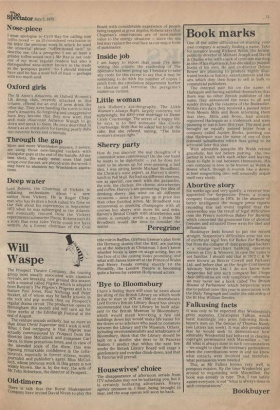Book marks
One of the sillier difficulties of starting your own company is actually finding a name. Take for instance young Richard Webb, the former publicity director of Michael Joseph and David & Charles who, with a lack of cynicism startling in one of his experience, has decided to publish books of his own. He and co-director Delian Bower are planning to produce highly illustrated books on history, entertainment and the arts which they thenhope to sell in bulk to commercial publishers.
The interpid pair hit on the name of Harlequin and having satisfied themselves that there was no other British publisher of the name, they announced the news to all and sundry through the columns of the Bookseller. Within two days they received a pained letter from Messrs Mills and Boon informing them that they, Mills and Boon, had already registered Harlequin as a trademark and were planning to use it later this year. The next post brought an equally pained letter from a company called Jupiter Books, pointing out that Harlequin was the name of one of their dormant subsidiaries which was going to be activated later this year.
With admirable panache Mr Webb retired gracefully, but not beforeputting the two parties in touch with each other and leaving them to fight it out between themselves. His own company is now to be known as Webb & Bower which, though it sounds like a downat-heel songwriting duo, will assuredly acquit itself very nicely.
Abortive story
Six weeks ago and very quietly, a receiver was appointed for Serpentine Press, a young company founded in 1974. In the absence of better intelligence the meagre press reports recording this sad event implied that the receivership was the result of legal difficulties over the Press's notorious Babes For Burning which concerned the gruesome fate of aborted foetuses and attracted three writs for libel and defamation.
Bookbuyer feels bound to put the record straight. Serpentine's difficulties arise not out of exorbitant legal fees for Babes For Burning but from the collapse of their principal backers — a strange merchant banking operation known as City & Western. In case the name is not familiar, I should add that in 1972 C & W were known as Beaver Cowell and Partners Ltd. and before that as the Anglo-Continental Advisory Service Ltd. I do not know how Serpentine fell into such company but I hope their difficulties are only temporary: otherwise we may never see a book called The British Houses of Parliament which Serpentine were due to publish later this year in association with the Daily Telegraph and under the editorship of the Rt Hon William Deedes.
Falkusing facts
It was only to be expected that Weidenfeld's gritty supremo, Christopher Falkus, would burst insultingly into print following Bookbuyer's item on The Genius of Thomas Hardy (see Letters last week). It was also predictable that he would seek to demonstrate how admirably Weidenfeld had behaved in clearing copyright permissions with Macmillan — "we did what is always done in such circumstances — we sought to clear the necessary permissions when the contributions were in and we knew what extracts were involved and therefore, what permissions were needed."
This, as Mr Falkus knows very well, is pompous evasion. By the time Weidenfeld got around to negotiating with Macmillan, the book was already in type. This, I can safely assure everyone, is not "what is always done in such circumstances".
Bookbuyer


































 Previous page
Previous page